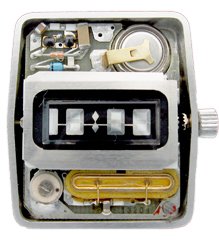BATTERY POWERED WATCHES
Battery powered wrist watches were first produced in the 50s.
The first type was the Electric watch, working by using an electromagnetically driven balance wheel with the switch contact on it, followed by the more reliable Electronic watch that was using a transistor as the switch.
The innovation that the Electric/Electronic watch brought was that the regulating organ, that is the balance wheel, was giving motion to the train wheels of the watch, instead of the traditional way of the mechanical watch where the train, powered by the mainspring is delivering the motion to the regulating organ (balance wheel).
A major step came in 1960 when BULOVA introduced the ACCUTRON. It was invented by the Swiss Max Hetzel and it was using a Tuning Fork as the time base. The accuracy in time keeping, compared with the rest of the watches was revolutionary.
In the later years, Omega and ETA also manufactured movements with Tuning Fork.
Tuning Fork watches, depending on the calibre, are resonating with 300Hz, 480Hz and 720Hz.
In the tuning fork, the same principle of motion as the Electronic watch applies, that is, as the regulating organ (tuning fork) is vibrating, motion is transmitted to the train.
In the late 60s, the QUARTZ watch evolved.
The Analogue Quartz watch is using a quartz crystal that vibrates at the frequency of 32768Hz. The IC (Integrated Circuit) through a series of 15 dividers is breaking up this frequency to 1Hz which gives the signal to the IC to send an electric current through the coil. As the current passes through the coil, the stator, made from soft iron, is momentarily magnetized causing the rotor to rotate and thus generate movement to the wheels.
Quartz introduced unsurpassed accuracy in timekeeping and the development of this technology also gave birth to the creation of Digital watches.
There are two types of digital watches the LED (Light Emitting Diode) and the LCD (Liquid Crystal Display).
Today, the vast majority of analogue battery powered watches produced are Quartz.




